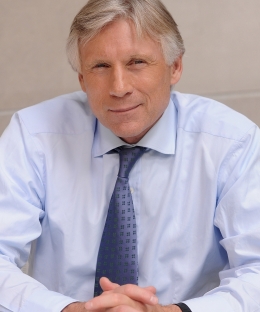
Lee C. Bollinger
- President Emeritus and Seth Low Professor of the University
J.D., Columbia Law School, 1971
B.S., University of Oregon, 1968
Free Speech
First Amendment

J.D., Columbia Law School, 1971
B.S., University of Oregon, 1968
Free Speech
First Amendment
Lee C. Bollinger ’71 is the president emeritus of Columbia University, which he led from 2002 to 2023—the longest tenure of an Ivy League president in the modern era. Throughout that time, he remained a respected, persistent public advocate for both freedom of expression and diversity in higher education.
Bollinger is Columbia’s first Seth Low Professor of the University and a member of the Columbia Law School faculty. Throughout his presidency, he continued to teach a popular undergraduate course, Freedom of Speech and Press, a version of which he continues to teach at the Law School. His latest of many books is University: A Reckoning, which describes how the structure of modern universities contributes to their success but also leaves them vulnerable. Bollinger makes the case that, if American universities are to continue to fulfill their critical role in society, academic freedom must be viewed to be as essential under the First Amendment as freedom of the press.
During his time leading Columbia, he undertook a wide array of transformational academic initiatives to assure the university’s future among the greatest institutions of higher learning in the world. He created Columbia’s first new campus in nearly a century in the onetime industrial area of Manhattanville, just north of the historic Morningside campus. Its award-winning, environmentally sustainable design was conceived not only to ensure vital space for Columbia’s long-term academic growth but also to expand civic engagement between the university and the West Harlem community. Manhattanville is home to the Mortimer B. Zuckerman Mind Brain Behavior Institute—among the world’s foremost neuroscience research centers—which Bollinger founded as an interdisciplinary cornerstone and common ground, bringing together faculty and students from both Columbia University Irving Medical Center and Morningside campuses.
Bollinger founded the university’s first new graduate school in 25 years, the Columbia Climate School, the first of its kind in the nation. Instead of building new campuses abroad, he established the Columbia Global Centers, a network of 11 flexible centers across four continents, to engage the university’s students, faculty, and alumni in regions and cultures around the world. He established Columbia World Projects, the Committee on Global Thought, and, at the Paris Global Center, the Institute for Ideas and Imagination—all intended to advance global scholarship, practical problem-solving, and creative thinking of international scope.
He also created Columbia’s first university-wide alumni association and Alumni Center on campus while leading the two most successful capital campaigns in university history. As a result, the whole university benefited from a wide range of new investment in academic programs and spaces during Bollinger’s tenure. He created Columbia’s first university-wide Office of the Executive Vice President for Research to support scholars in every field. The Fu Foundation School of Engineering and Applied Science grew to an entirely new scale and academic standing among peer institutions appropriate to the pivotal role of applied science and technology at the center of modern life and interdisciplinary research. Because virtually every area of research and teaching relies on the field of data science, Bollinger also established the Data Science Institute. The Medical Center benefited from a massive new investment in expanded research space and clinical practice, with new buildings, new laboratories attracting record shares of National Institutes of Health funding, and a major expansion of ColumbiaDoctors across the New York area. Through university-wide interdisciplinary initiatives in neuroscience, cancer research, and precision medicine, he deepened the interdisciplinary connection between the Medical Center, the Arts and Sciences, and professional schools.
Under his leadership, Columbia vastly increased financial aid and limited the need for student loans in the undergraduate College and Engineering School, and graduate schools, ensuring a Columbia education is affordable and accessible to the widest diversity of students, regardless of family income. He further worked to enhance both the diversity of experience and energy of campus life, supporting Columbia’s successful efforts, led by the School of General Studies, to welcome more recent military veterans than the rest of the Ivy League combined and, after more than four decades, reestablish Columbia’s Navy ROTC program. He was also successful in fulfilling his commitment to revive Columbia intercollegiate athletics, resulting in a record number of Ivy League championships, national championships, and winning teams across the program.
Reflecting his own longtime commitment to the essential role of free speech and press as a First Amendment scholar, from the outset of his presidency Bollinger led the reimagining of Columbia’s renowned Journalism School for a digital age. He established a university-wide ecosystem for new research, teaching, and advocacy on the emerging questions and challenges created by the digital public square, including the Knight First Amendment Institute at Columbia University, Columbia Global Freedom of Expression, and the Tow Center for Digital Journalism and the Brown Institute for Media Innovation at the Journalism School.
As president, Bollinger’s commitment to excellence in the university’s built environment is evident across all of Columbia’s campuses: Renzo Piano’s innovative urban plan for Manhattanville; the Roy and Diana Vagelos Education Center at the Medical Center and the new Columbia Business School, both designed by Diller Scofidio + Renfro; Rafael Moneo’s innovative design for the Northwest Corner Building, completing the original Morningside campus plan; the Campbell Sports Center at Baker Athletics Complex designed by Steven Holl; the Gary C. Comer Geochemistry Building at Columbia’s Lamont-Doherty Earth Observatory; as well as a wide range of major capital improvements, innovative renovations, and environmentally sustainable systems in every part of the university.
From November 1996 to 2002, Bollinger was president of the University of Michigan, where he also served as a law professor and dean of the law school. At Michigan, he led the seminal Supreme Court cases that first upheld the constitutional right of colleges and universities to consider race in admissions to build a more diverse learning community—a well-established and repeatedly affirmed precedent that the current Supreme Court reversed in 2023.
Bollinger regularly collaborates with fellow First Amendment scholar and University of Chicago Law School Professor Geoffrey R. Stone. Their book Roe v. Dobbs: The Past, Present, and Future of a Constitutional Right to Abortion was published in 2024, and A Legacy of Discrimination: The Essential Constitutionality of Affirmative Action, was published in 2023. Their latest collaboration, Money, Politics, and the First Amendment: Fifty Years of Supreme Court Decisions and Campaign Finance Reforms, will address the legacy of Buckley v. Valeo on political speech, and will be published by Oxford University Press in March 2026.
Bollinger has received the National Humanitarian Award from the National Conference for Community and Justice and the National Equal Justice Award from the NAACP Legal Defense and Educational Fund for his leadership on affirmative action. He also received the Clark Kerr Award, the highest award conferred by the faculty of the University of California, Berkeley, for his service to higher education, especially on matters of freedom of speech and diversity. Most recently he received the Alexander Hamilton Medal from Columbia College and the Judy Blume Lifetime Achievement Award from the National Coalition Against Censorship. Bollinger is the recipient of multiple honorary degrees from universities in this country and abroad.
He is a former director of Graham Holdings Company (formerly The Washington Post Company) and served as a member of the Pulitzer Prize Board. He is a member of the Council on Foreign Relations, the American Academy of Arts & Sciences (elected in 1992), and the American Philosophical Society (elected in 2004). From 2007 to 2012, he was a director of the Federal Reserve Bank of New York, where he served as chair from 2010 to 2012.
As a law student, Bollinger was an articles editor of the Columbia Law Review. After graduating, he served as a law clerk for Judge Wilfred Feinberg on the U.S. Court of Appeals for the 2nd Circuit and for Chief Justice Warren Burger on the U.S. Supreme Court. He joined the University of Michigan Law School faculty in 1973.
Bollinger was born in Santa Rosa, California, and grew up there and in Baker City, Oregon, where his father was the publisher of the local newspaper. He is married to artist Jean Magnano Bollinger, and they have two children and five grandchildren.

The fundamental mission of the university to enhance knowledge is, Bollinger explains, a notion rooted deeply in the Enlightenment ideas animating our Constitution and specifically the First Amendment. The university, for all its faults and shortcomings, not only generates the pioneering ideas that benefit society and contribute to democratic self-government, but also fulfill the innately human drive to understand the world and live a good life. In University: A Reckoning, Bollinger describes how the admittedly unwieldy structure of the modern university—and, importantly, the collective interplay among the nation’s universities—contribute to its unparalleled success but also leave it vulnerable.
In the face of unprecedented recent efforts by the federal and several state governments to exercise control over teaching, research, and governance of both public and private universities, Bollinger makes the case that, if American universities are to continue to fulfill their critical truth-seeking role in a free society, we must view academic freedom to be as essential under the First Amendment as we do freedom of the press.
In Search of an Open Mind (2024)
Roe v. Dobbs: The Past, Present, and Future of a Constitutional Right to Abortion, co-edited with Geoffrey R. Stone (2024)
A Legacy of Discrimination: The Essential Constitutionality of Affirmative Action, with Geoffrey R. Stone (2023)
Social Media, Freedom of Speech, and the Future of our Democracy, co-edited with Geoffrey R. Stone (2022)
National Security, Leaks and Freedom of the Press: The Pentagon Papers Fifty Years On, co-edited with Geoffrey R. Stone (2021)
Regardless of Frontiers: Global Freedom of Expression in a Troubled World, co-edited with Agnes Callamard (2021)
The Free Speech Century, co-edited with Geoffrey R. Stone (2018)
Uninhibited, Robust, and Wide-Open: A Free Press for a New Century (2010)
Eternally Vigilant: Free Speech in the Modern Era, co-edited with Geoffrey R. Stone (2001)
Images of a Free Press (1991)
The Tolerant Society: Freedom of Speech and Extremist Speech in America, (1986)
The Atlantic: “Universities Deserve Special Standing”
The Atlantic: “The End of Affirmative Action Would Be a Disaster”
The Brian Lehrer Show on WNYC: “The Supreme Court and Abortion Access”
The Chronicle of Higher Education: “We’re in the Midst of an Authoritarian Takeover”
The Chronicle of Higher Education: “The No-Censorship Approach to Life”
Columbia Magazine: “Columbia President Lee C. Bollinger Looks Back on Two Remarkable Decades”
Columbia News: “Lee C. Bollinger on the First Amendment, Free Speech, Affirmative Action, and More”
The Economist: “Lee Bollinger Laments the Ruling by America’s Supreme Court Against Affirmative Action”
Harvard Law Review Forum: “What Once Was Lost Must Now Be Found: Rediscovering an Affirmative Action Jurisprudence Informed by the Reality of Race in America”
The New York Times: “Affirmative Action Isn’t Just a Legal Issue. It’s Also a Historical One.”
The New Yorker: “Sixty Years Later, We Need a New Brown”
Time: “Lee Bollinger’s Last-Ditch Case to Save Affirmative Action”
UnCommon Law podcast in Bloomberg Law: “The End of Affirmative Action in College Admissions”
The Washington Post: “Americans Only Figured Out Free Speech 50 Years Ago. Here’s How the World Can Follow Our Lead”

The wide-ranging scholarly interests of the Columbia Law School faculty are reflected in the array of books they edit and write on legal, economic, political, and social issues. Here are seven titles they published this year.